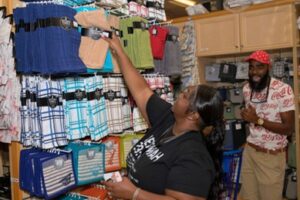NASSAU, The Bahamas – While addressing the African Export-Import Bank (Afreximbank) 31st Annual Meetings (AAM2024), on June 13, 2024, Prime Minister and Minister of Finance the Hon. Philip Davis noted that he was reminded of the “boundless possibilities that define the Caribbean and, indeed, The Bahamas.”
“Our region is not just a collection of islands but a vibrant tapestry of culture, innovation, and opportunity,” Prime Minister Davis said, at the event held at the Baha Mar Convention Centre. “The Bahamas, with its strategic location and dynamic economy, serves as a symbol of possibility and a gateway to broader economic horizons.”
He added: “Growing up on Cat Island, one of our country’s beautiful family of islands, I was always filled with big dreams for my country. I may not have envisioned the specific paths our economy would take, but I always believed in the limitless potential of our nation. Our history is one of invention, disruption, resilience, and innovation. We have pioneered in various fields, from tourism to financial services, transforming challenges into opportunities and showcasing our ability to innovate and lead.”
financial services, transforming challenges into opportunities and showcasing our ability to innovate and lead.”
Prime Minister Davis pointed out that, just as The Bahamas had embraced its unique position to become a global leader in tourism and financial services, so too can they, as a collective of African and Caribbean nations, harness “our potential to shape our own economic destiny.”
“Today, our presence here underscores the readiness of The Bahamas, and indeed the Caribbean, to be a home for global leaders in various sectors,” he noted. “The Bahamas has always been more than just a tropical paradise. It is a place of possibility, where dreams are not just dreamt but realized. This ethos is reflected in our history and in the transformative innovations we continue to champion.”
“In a similar vein, Africa is a land of immense potential, brimming with opportunities for growth and development,” Prime Minister Davis noted. “Our collective mission is to harness this potential, creating pathways to prosperity that benefit not just our regions but the global community.”
Prime Minister Davis went further to outline “a blueprint for collaboration that we all can embrace.”
“This blueprint encompasses key initiatives designed to unite our banking systems, enhance financial inclusivity, and catalyze economic growth across Africa and the Caribbean,” he said. “This strategic plan is anchored in our shared desire for prosperity and our commitment to overcoming the challenges of distance and disparate regulatory environments.”
Prime Minister Davis added: “Establishing a Joint Financial Task Force can be the cornerstone of our blueprint. This collaborative body will harness the expertise of banking and finance leaders, policymakers, and stakeholders from both regions. Tasked with identifying and dismantling barriers to banking integration, this task force symbolizes our collective will to forge a unified path forward.”
Prime Minister Davis suggested that they could also harmonize their regulatory frameworks to address “critical hurdles” in their journey.
“By aligning our anti-money laundering (AML) standards, counter-financing of terrorism (CFT) policies, and digital currency regulations, we create a seamless environment conducive to cross-regional banking operations,” he stated. “With its robust regulatory landscape, exemplified by the DARE Act, The Bahamas is a pioneer in this endeavor, guiding our efforts towards regulatory excellence and stability.”
He added: “Additionally, promoting financial inclusion and digital banking leverages the power of technology to erase boundaries and open doors. Inspired by The Bahamas’ pioneering launch of the Sand Dollar, the world’s first central bank digital currency, this facet of the blueprint envisions a future where digital banking platforms extend financial services to every corner of our regions, ensuring that none of our citizens is left behind.”
Prime Minister Davis said that facilitating trade and investment through streamlined banking procedures and dedicated financial instruments could bolster economic exchanges between Africa and the Caribbean. By focusing on sectors of mutual interest like tourism, agriculture, renewable energy, and technology, he added, they could unlock new avenues for growth and collaboration.
“Key to this blueprint is developing human capital, underscoring the belief that our greatest asset is our people,” Prime Minister Davis said. “Joint educational initiatives and training programs will equip banking professionals with cutting-edge skills in fintech, cybersecurity, and regulatory compliance, ensuring our financial sector is robust, secure, and innovative.”
“Creating a bilateral payment system or exploring the development of a shared digital currency represents a bold step towards financial sovereignty and integration,” he added. “Such an initiative will facilitate smoother trade and investment, reduce our reliance on external currencies, and strengthen our economic bonds.
“Together, Africa and the Caribbean can embark on this transformative journey, driven by unity, innovation, and mutual respect. Let this blueprint be our guide as we strive to unlock the full potential of our regions, forging a path towards prosperity that will be remembered for generations yet to come.”
Prime Minister Davis noted that the Afreximbank annual meeting represented “a pivotal moment for all of us, especially for Small Island Developing States (SIDS).”
He said: “We face a global financial system that often locks us out, creating inequities perpetuated by the Global North. These powerful nations frequently establish one set of rules for themselves and another for developing states, undermining our progress and prosperity. It is imperative that we call out this behavior and demand an inclusive, fair model for the global financial system.”
Prime Minister Davis continued: “Our journey together – Africa and the Caribbean – supported by the visions we share and the actions we are committed to, heralds the dawn of a new era. An era where financial inclusivity fostered by innovations like the Sand Dollar and robust regulatory frameworks become the standard across our waters. An era where our joint task forces and harmonized policies pave the way for a future where trade, investment, and mutual growth flow as freely as the waters that connect us.”
He said that, as they all looked to the horizon, they should see not a barrier but a vast, uncharted ocean of potential.
“Let us decide, here and now, that the waters which separate our lands will not impede our progress but will act as the very medium through which we unite our dreams and ambitions,” Prime Minister Davis said.
He added: “Friends, I ask the question again – will we allow the separation of water to get in our way? Or will we embark together on this bold journey, proving that our spirits are stronger than the oceans, our resolve deeper than the deepest sea, and our potential boundless as the sky above? The choice is ours. Let us choose to bridge the waters, to unite our dreams, and to craft a future where Africa and the Caribbean thrive together, in prosperity and partnership. This is our moment. Let us seize it with both hands, for the sake of our present and for the countless generations to come.”
“Lastly, I hope that this annual meeting in the Bahamas is successful – and I have no doubt that it will be – and that you have time to kick off your shoes, get your feet wet in our sands, get some sand in your toes, enjoy the warmth of our people, and discover why it is better in The Bahamas,” Prime Minister Davis said.
“The moment is now. Let us seize the moment.”
PHOTO CAPTION
Prime Minister and Minister of Finance the Hon. Philip Davis addresses the African Export-Import Bank (Afreximbank) 31st Annual Meetings (AAM2024), on June 13, 2024, held at Baha Mar Convention Centre.
(BIS Photos/Eric Rose)




















